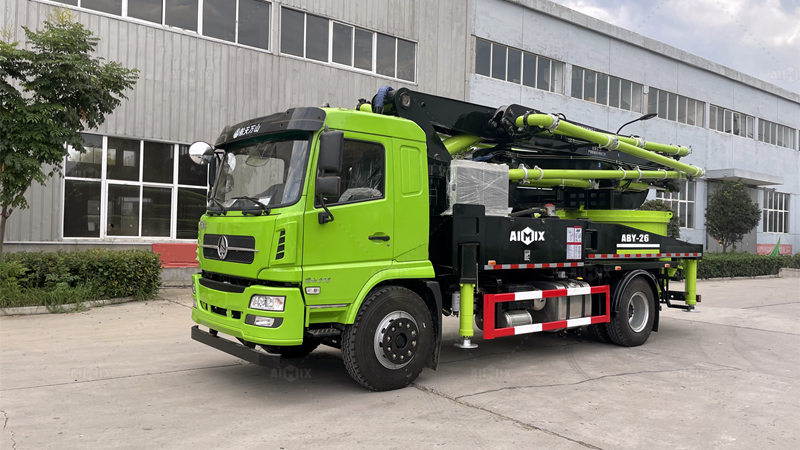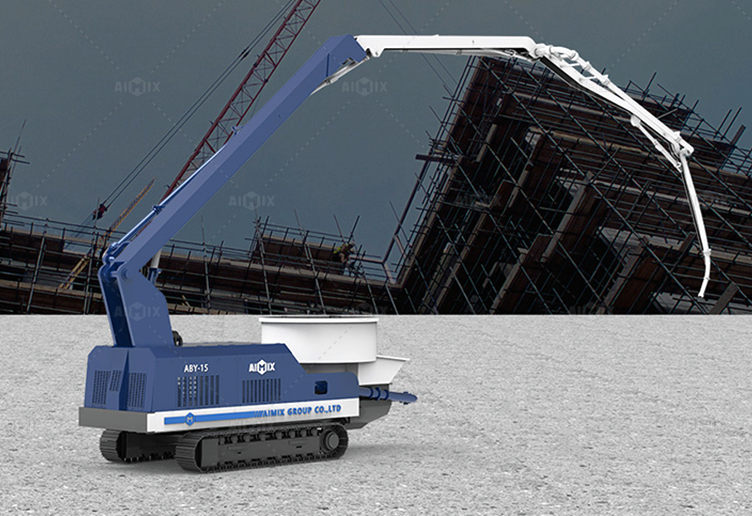In emergency engineering projects, especially those involving urgent infrastructure repairs, quick deployment and high operational efficiency are essential. One of the most crucial pieces of equipment in such situations is the mobile pump concrete, commonly known for its ability to pump concrete quickly and efficiently to locations that are difficult to access. When considering the purchase of a mini concrete pump truck for emergency engineering in South Africa, there are several key specifications you must confirm with the concrete pump company to ensure you select the right equipment for the job. Understanding these specifications will help you ensure the pump meets your specific needs, improves project outcomes, and avoids unnecessary complications down the line.
Concrete Pump Type: Mini Concrete Pump Truck vs. Mobile Pump Concrete
The first specification you need to clarify is the type of concrete pump that best suits your emergency engineering requirements. While mini concrete pump trucks are excellent for small-scale and medium projects, they may not always be suitable for larger-scale emergency operations. On the other hand, mobile pump concrete units offer greater flexibility, particularly for challenging, hard-to-reach sites.
Mini Concrete Pump Truck: These trucks are designed for quick setups and mobility, ideal for small to medium-scale jobs, especially where space is limited. They are perfect for emergency applications where quick relocation is necessary.
Mobile Pump Concrete: Mobile pumps provide higher capacity and can handle larger volumes of concrete. If your emergency project involves significant concrete pouring over larger areas or deeper construction requirements, this type of pump is more suitable.
Before finalizing a purchase, confirm whether you need a mini concrete pump truck or a mobile pump concrete system based on the scope and scale of your emergency engineering project.
Maximum Output Capacity
One of the most crucial specifications to consider when buying a concrete pump is the maximum output capacity. This specification defines how much concrete the pump can move per hour, directly impacting the speed and efficiency of your project. In emergency scenarios, time is often of the essence, and ensuring that the pump can handle the required volume without breaking down is essential.
For instance, the typical mobile pump concrete might have a higher output capacity, ranging from 30 to 80 cubic meters per hour, depending on the model and the manufacturer. Confirm with the concrete pump company whether the pump can meet the volume requirements of your project, as the demand for concrete in emergencies can fluctuate rapidly.
If the emergency site requires higher capacity pumping for multiple pour locations or rapid pumping, the specifications of output capacity should be aligned with these needs.
Pressure and Delivery Range
Pressure is another critical factor in concrete pumping operations. The ability of the concrete pump to achieve the necessary pressure ensures that concrete is delivered accurately and smoothly, particularly in high-rise or deep excavation projects. During emergency engineering work, especially in areas with infrastructure damage, high pressure may be needed to overcome obstacles such as height or distance.
Delivery Pressure: The delivery pressure of the pump determines how far and how high the concrete can be pumped. For most standard applications, a pressure of 80 to 100 bar is sufficient, but for challenging applications, such as pumping into deep or elevated locations, a higher pressure range may be necessary.
Horizontal and Vertical Reach: The concrete pump South Africa should also meet specific horizontal and vertical reach requirements, ensuring the pump can cover the emergency site effectively. Confirm the mobile pump concrete system’s reach, especially if you need to pump over long distances or into high-rise structures.
Confirm these reach capabilities with your concrete pump company to ensure the equipment can meet the demanding requirements of your emergency site.
Power Source and Fuel Consumption
Understanding the power requirements of the mobile pump concrete is essential for ensuring smooth operation on-site. Depending on the location of your emergency project, you might encounter limitations in power supply, especially in remote areas or those lacking grid infrastructure. It’s important to confirm whether the pump runs on electricity, diesel, or a hybrid power source.
Diesel Engines: Diesel-powered pumps are often the preferred choice for mobile pumps, as they are self-contained and don’t rely on external power sources. However, they may come with higher fuel consumption, so it’s important to calculate fuel costs in your budget.
Electric Options: If your emergency site has a reliable power supply, electric pumps may provide a cleaner and more economical option, with lower operating costs in terms of fuel consumption.
When discussing the mobile pump concrete with your concrete pump company, ensure you understand the power consumption and fuel efficiency of the model you’re considering.

Durability and Build Quality
In emergency engineering projects, equipment durability is a priority. The harsh operating conditions, potential for extreme weather, and rough handling during transport require a robust and reliable concrete pump. The pump’s structural integrity, including wear-resistant materials used in the mini concrete pump truck or mobile pump concrete, should be a point of concern during the purchase.
Ask the concrete pump company about the materials used in critical parts, such as the pump’s pipelines, hoses, and valves. These parts must be resistant to wear and corrosion, especially when pumping aggregate mixes with high abrasion potential or working in extremely harsh conditions like heat, dust, or rain.
Ease of Operation and Maintenance
Emergency engineering projects often require operators to work under tight deadlines and in difficult conditions. It is essential that the mobile pump concrete is easy to operate and maintain. Modern pumps often come with intuitive control systems that streamline operation, especially for emergency scenarios. The mini concrete pump truck may have more straightforward controls, while mobile units might require more advanced training for operators.
Ensure that the pump you choose comes with:
User-friendly control panels: Simplified control systems reduce the chances of mistakes and improve speed in emergency operations.
Remote Monitoring Capabilities: Some pumps now offer remote monitoring through IoT systems, which allows operators to track performance, diagnose problems, and make necessary adjustments in real time. This can significantly improve response times and reduce maintenance downtime during emergency use.
Additionally, confirm the mobile pump concrete’s maintenance requirements with the concrete pump company, as regular upkeep is essential to ensuring that the pump can continue functioning without failure in future emergencies.
Portability and Mobilization
Portability is a significant factor in emergency situations where rapid deployment is critical. A mini concrete pump truck or mobile pump concrete needs to be easily transportable to various job sites within a short time frame. Whether using the pump for emergency road repairs, disaster recovery, or other urgent infrastructure needs, the ability to quickly mobilize the equipment is essential.
Check the overall weight and transportation requirements of the pump. Ensure that it can be easily moved between sites and fit into confined spaces, especially in urban or challenging terrain. Additionally, confirm the stability and safety features of the pump during transportation.
Cost and Warranty
Lastly, it’s important to discuss the cost of the pump and what is included in the warranty. Given that the concrete pump south africa market can be competitive, understanding the price breakdown is essential. Make sure to inquire about the total cost, including maintenance contracts, spare parts availability, and warranty coverage. Long-term service agreements can save you costs on unexpected repairs, especially for high-usage emergency scenarios.
Ensure the concrete pump company provides clear and detailed information about warranty coverage and the expected lifespan of the equipment under normal operating conditions.
When purchasing a mobile pump concrete for emergency engineering projects in South Africa, it’s essential to thoroughly evaluate the specifications provided by the concrete pump company. Confirming details such as the pump’s type, capacity, power source, durability, maintenance requirements, and transportability will ensure that you select the right equipment for your specific needs. The mini concrete pump truck and mobile pump concrete offer great flexibility, but the right choice depends on your unique project demands. By paying close attention to these specifications, you can ensure a smooth, efficient, and effective concrete pumping process for your emergency engineering projects.
